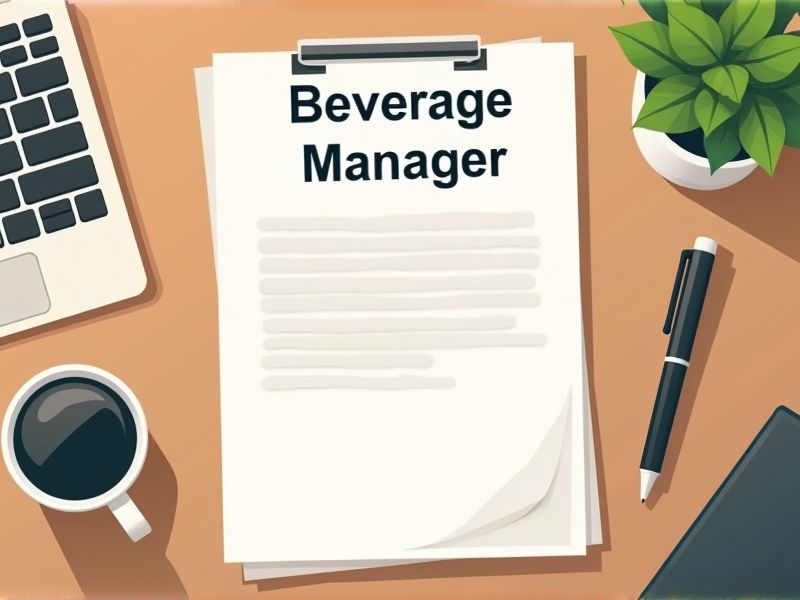
A Beverage Manager oversees the quality and service of drinks, ensuring customer satisfaction in a hospitality setting. Certification provides validation of expertise in areas such as mixology, wine stewardship, and bar operations. This formal recognition enhances credibility, opening up opportunities for career advancement. Below are some essential certifications that could benefit a Beverage Manager.
Certified Beverage Professional (CBP)
Certified Beverage Professional (CBP) status enhances a beverage manager's credibility, as certification serves as a formal recognition of expertise. The structured education provided through CBP training equips managers with up-to-date knowledge on industry trends and regulations, directly impacting decision-making. Holding this certification can result in improved service quality and operational efficiency, as managers are better prepared to curate drink menus and manage inventory. The certification may boost career advancement opportunities and salary potential, given the competitive advantage it provides in the beverage industry.
Certified Cicerone(r)
A Certified Cicerone(r) ensures that beverage managers have a comprehensive understanding of beer styles, pairing expertise, and service standards. This certification guarantees that the manager can enhance customer satisfaction by offering informed recommendations and maintaining quality control. Proper management of draft systems, which is crucial for delivering optimal beer experiences, is facilitated through their knowledge. Their expertise contributes to increased sales and a more refined beverage program, benefiting the establishment financially.
WSET Level 2 Award in Wines
A Beverage Manager needs the WSET Level 2 Award in Wines to gain a comprehensive understanding of different wine styles and their characteristics, ensuring informed inventory decisions. With this knowledge, the manager can effectively train staff on wine pairings, enhancing the dining experience and boosting customer satisfaction. A credible certification like WSET Level 2 adds weight to the manager's expertise, fostering trust with suppliers and clientele. Mastery in wines leads to improved wine sales strategies, directly impacting the restaurant's profitability.
WSET Level 3 Award in Wines
The WSET Level 3 Award in Wines equips a beverage manager with advanced knowledge of wine regions, production methods, and grape varieties, allowing for more informed decision-making in menu selection and wine pairing. Expertise gained ensures a more nuanced understanding of wine quality and value, enhancing the guest dining experience. The certification fosters credibility and trust from clients and colleagues, crucial in the competitive hospitality industry. The comprehensive training supports effective inventory management and cost control, essential for profitability.
Certified Sommelier
A Certified Sommelier possesses specialized knowledge of wines and spirits, leading to enhanced beverage program development for an establishment. Their expertise in tasting and pairing ensures that the venue offers an elevated dining experience that attracts discerning customers. They contribute to cost management by choosing quality wines that align with budget while maximizing profit margins. Their certification often lends credibility to the establishment, helping to differentiate it in a competitive market.
TIPS Certification
TIPS Certification educates beverage managers on responsible alcohol service, reducing the risk of legal liabilities associated with overserving. Understanding alcohol regulations through this training minimizes incidents of over-consumption, leading to fewer alcohol-related accidents. Certification fosters a safe environment for patrons, which indirectly enhances the establishment's reputation. Equipped with this knowledge, managers can train staff effectively, maintaining compliance with state and local laws.
Responsible Service of Alcohol (RSA)
Responsible Service of Alcohol (RSA) reduces the risk of alcohol-related incidents, ensuring a safer environment for patrons and staff. Legal compliance with local alcohol laws protects establishments from potential fines and legal actions. Proper RSA can enhance customer satisfaction by promoting a responsible and enjoyable atmosphere. Staff trained in RSA contribute to the reputation of the venue as a responsible and community-conscious business.
HACCP Certification
HACCP Certification ensures a Beverage Manager can effectively identify and manage potential food safety hazards, reducing the risk of contamination. By implementing HACCP standards, a manager fosters compliance with food safety regulations, safeguarding the company from legal consequences. Equipped with certification, the manager enhances the establishment's reputation for safety and quality, attracting more customers. This qualification also delivers a structured approach to monitoring and improving operational processes, driving efficiency and consistency in beverage production and service.
Certified Food and Beverage Manager (CFBM)
The Certified Food and Beverage Manager (CFBM) credential assures that a Beverage Manager has a comprehensive understanding of industry standards and best practices, enhancing operational efficiency. With CFBM certification, beverage managers demonstrate expertise in managing hygiene and food safety protocols, crucial for maintaining customer health and safety. The certification also signifies advanced skills in cost management and inventory control, critical for maximizing profitability in the beverage sector. Employers often prefer certified managers due to their proven ability to implement training programs that boost team performance and customer satisfaction.
CPR/First Aid Certification
Beverage Managers often work in environments where accidents, such as slips or falls, can occur, so having CPR/First Aid certification allows them to respond effectively to emergencies. Immediate response to medical situations minimizes potential harm or fatalities, ensuring a safer workplace. Certification enhances the manager's leadership by demonstrating a commitment to employee and customer safety. Compliance with health and safety regulations often requires such certifications to reduce liability and promote a responsible establishment.
Summary
By obtaining certifications, you enhance your credibility within the beverage industry, leading to increased trust from employers and colleagues. This credibility often facilitates career advancement opportunities and opens doors to higher-level positions. Certification equips you with specialized knowledge, enabling you to implement more effective beverage management strategies. Industry recognition from certifications can also lead to higher earning potential.
